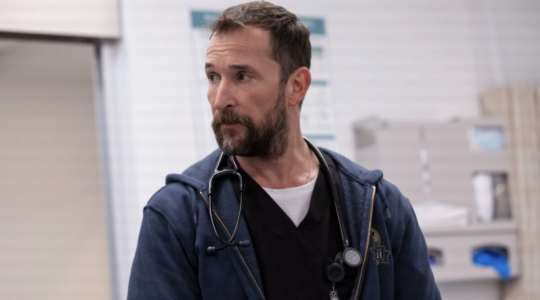
Eric Anderson portrays Shlomo Carlebach in the new Broadway musical “Soul Doctor” about the rabbi’s life. (Press)
Few figures in the last hundred years have had as broad an impact on Jewish life as Shlomo Carlebach, if any (disagree? let me know). Despite the controversies that dogged him in his lifetime, today there is nary a quarter of the Jewish world where his melodies have not entered the canon, embraced by everyone from Reform summer camps to Brooklyn hasidim. Which may be what lends an air of the inevitable to the central dramas of “Soul Doctor,” the musical about Carlebach’s life that opened last week on Broadway.
The show is not a biopic. There is little effort made at a comprehensive portrait of the man and his influence, nor even to stay very true to the historical record. The father-son struggle over Carlebach’s path in religious leadership, played up to great dramatic effect in the show, is probably untrue. So (I suspect) is the pained struggle (at first) to break with Orthodox modesty strictures and embrace women. And certainly not Carlebach’s monastic abstention from romantic love in the name of ministering to his “holy beggars,” a particularly odd choice by the producers considering the history.
But watching these struggles unfold on stage, one can’t escape the shadow of vindication we all know to be coming. Today there is little that’s controversial about the life’s work of Carlebach, even in the deeply conservative corners of Orthodoxy that once shunned him. The minyan of white-shirted Brooklyn haredim who waved their hands to the music at last night’s performance are proof enough of that. In the show, Carlebach’s critics come off as either naive (if well intentioned), angry or ignorant. Whatever the case, they wind up on the wrong side of history.

Eric Anderson and Amber Iman as Shlomo Carlebach and Nina Simone in the new Broadway musical “Soul Doctor” about the rabbi’s life. (Press)
Nevertheless, there’s much for the fan of Carlebach’s music (and even the sappy musical theater lover) to savor here. The lustrous arrangements of Carlebach melodies are among the most gorgeous ever done. And there are a number of delicious ironies, like setting Timothy Leary’s admonition to “tune in, turn on, drop out” to the tune of Carlebach’s “Lord, Get Me High”; or Carlebach’s father announcing he went to Selma to “pray with his feet” (a civil rights activist, Heschel plagiarizer AND an opponent of the folk revival? the mind reels); or the rhyming of hora with “Sodom and Gomorrah” (I’m particularly annoyed never to have come up with that one).
Bottom line: If you have more tolerance than I for lyrics that err on the side of cheesy, and more patience for that bewildering Jewish addiction to clapping along on the downbeat (the performance is a veritable clap-athon), “Soul Doctor” will not disappoint.
JTA has documented Jewish history in real-time for over a century. Keep our journalism strong by joining us in supporting independent, award-winning reporting.





